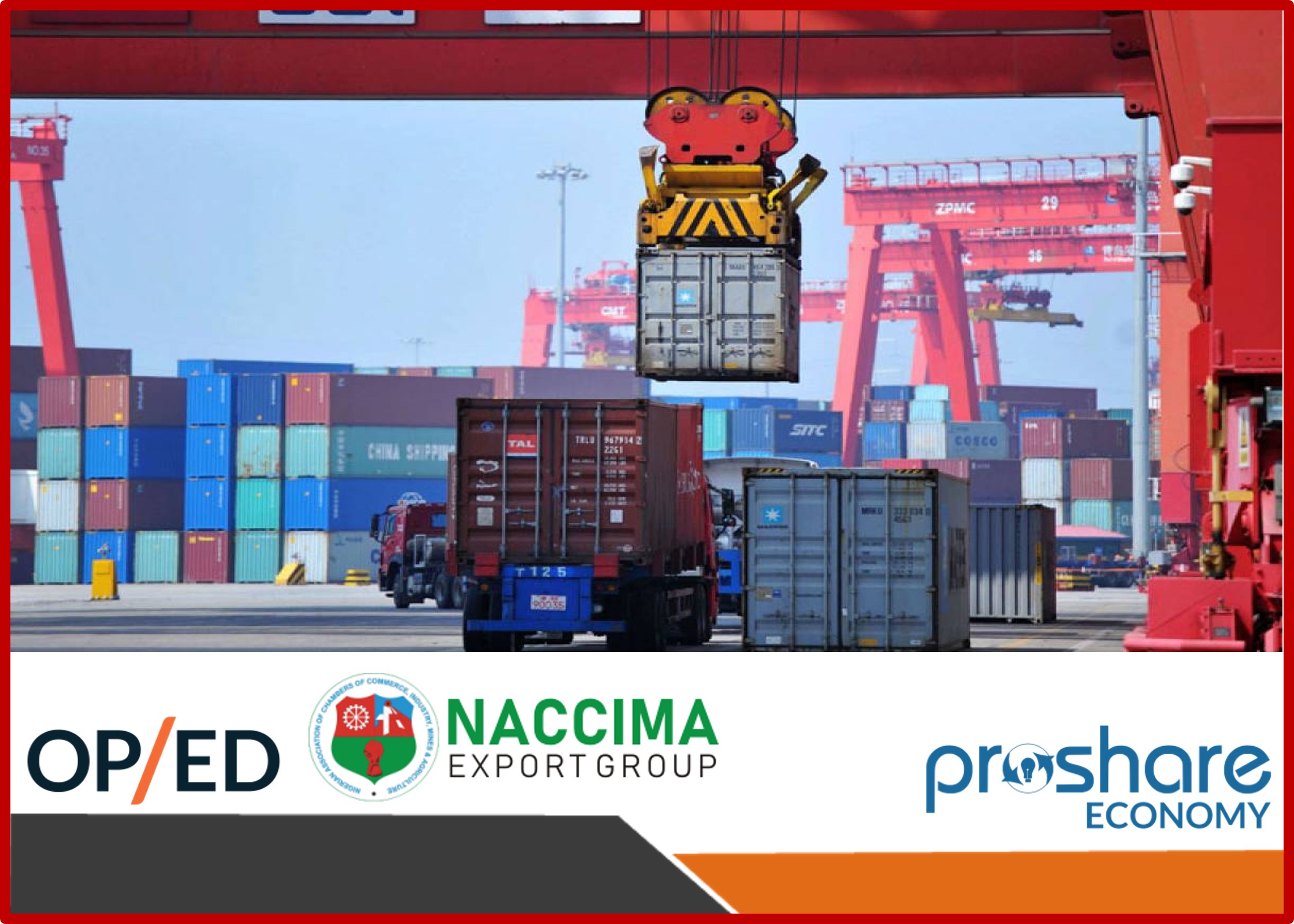Thursday, November 04, 2021 / 02:12 PM / by Ade Adefeko / Header ImageCredit: Free Press Journal
Export Expansion Grant (EEG) scheme is a vital policy instrument toboost the competitiveness of Nigerian products in the international market andgrow non-oil exports. As the bulk of Nigeria's non-oil exports are agro-allied,the impact of the scheme is felt across the value chain, affecting the lives ofover 10 million Nigerians directly and indirectly.
Why is EEG Needed?
Nigerian exporters face cost disadvantages on account of infrastructuraldeficiencies and the high cost of doing business. The cost of logistics inNigeria is among the highest in the region. The Global Competitiveness Index(GCI) evaluated by the World Economic Forum, covering 141 economies, measuresnational competitiveness defined as the set of institutions, policies andfactors that determine the level of productivity.
According to the GCI 2019, Nigeria was ranked 116 with a score of 48.3compared to Kenya at 95th place with a score of 51.2.Even regional rivals such as Ghana have ranked above at 111th placewhereas South Africa, the second-largest economy in sub-Saharan Africa wasranked 60th with a score of 62.4. Nigeria'scompetitiveness was impacted by a lack of enabling infrastructure and skillsand innovation.
Multiple taxations at Federal, State and local government levels has acascading effect and add to the cost of goods exported. Therefore, in a way, weare "exporting taxes with the goods" in the absence of a mechanism toneutralize the incidence of taxation. EEG helps to mitigate and cushion thesecost disadvantages. Although it is apparent that the prevailing EEG rates(which have been reduced over time) only provide a partial relief and arecertainly not sufficient.
Nigeria's non-oil exports are still negligible and account for less than5% of the total merchandise exports of USD 62 billion (WTO). The exportsplummeted to USD 34 billion (WTO) as global demand for crude oil crashed in2020. Even compared to our African peers, there is a great potential toincrease export performance. The merchandise exports (mostly agriculturalgoods) of leading sub-Saharan African countries are significantly higher thanthose of Nigeria (Ivory Coast: USD 12.2 bn; Kenya USD 6bn) (WTO). Most notably,while, Nigeria's exports in 2020 crashed, the above countries mainly exportingagricultural products even sustained their exports during the pandemic.
Regional Trade under AfCFTA
Due to the size of our manufacturing sector, Nigeria has the potentialto be a key trade partner for many regional countries which are outside of theECOWAS. Improving the competitiveness of our exports is a prerequisite to ourability to take advantage of the emerging opportunity. However, this will taketime as the implementation mechanism of the mega trade, the bloc is still awork in progress.
International Practice
Most developing countries based their economic growth on exports andintegrating with global value chains (GVC's). A package of incentives is given topromote exports.
- China gives up to 13% export tax rebate on its export despite its infrastructural advantages and high efficiency. China is the world's No.1 exporter with merchandise exports of USD 2.5 trillion in 2020(WTO).
- India's merchandise exports in 2020 were USD 276 billion. It offers a package of incentives that include a refund of taxes on export production, interest rate subvention, duty drawback and PLI (Production Linked Incentive). The new flagship PLI scheme announced in 2020 has budgeted a subsidy of about USD 20 billion (Rupees 1459 billion) to be calculated up to 15% on total turnover (both domestic and exports) to generate employment and boost exports till 2025.
- Viet Nam (population 90 million) has emerged as a leading exporter in recent years with merchandise exports of USD 283 billion in 2020 (Ranked # 20 as per WTO Report 2021) founded on infrastructural advantages, high productivity and tax incentives.
Impact of COVID-19 Pandemic
Thefive key impact areas for non-oil export in terms of opportunities and risksare highlighted below:
- While Nigeria's overall merchandise exports declined from USD 62 in 2019 to USD 34 billion in 2020 (WTO), exports of non-oil products were not impacted with their share in Nigeria's total exports increasing to 7% (NBS)
- Non-oil exporters suffered from a steep increase in shipping costs due to a shortage of containers
- The liquidity of the non-oil export sector was affected as funds were locked up in unpaid EEG claims
- With global demand for fossil fuels set to be replaced in the long run, the need for diversification of the economy becomes even greater
- Many countries are trying to attract investment in local and regional supply chains to reduce dependence on China. This offers an opportunity to Nigeria
EEG - Way forward
OPEXA has identified 5 key areas that need to be addressed to improvethe impact and effectiveness of the EEG scheme:
- Budgetary allocation
- Criteria
- Policymaking body
- Procedures
- Continuity
Sustainable Budgetary Allocation
Lack of a sustainable budgetary allocation remains the major constraintin the effective implementation of the policy. The EEG guidelines introduced in2017 were founded on the premise that an annual budgetary allocation would bemade. However, the actual allocation in the last 4 years has met only afraction of the requirement and in some cases even lapsed without anyutilization. To date, EEG claims from 2017-20 onwards have accumulated to overNGN 137 billion. At the last inter-ministerial held in November 2020, it wasresolved to clear this backlog by way of promissory notes. Therefore, there isa need to put in place a sustainable mechanism for backing the policy withresources either through a budget line or a promissory note instrument.
Eligibility Criteria
The extant criteria, especially 5% annual growth in exports and 15%growth in investment needs to be revised and made real. 2020 has been anexceptional year due to the COVID-19 pandemic and most exporters will be unableto achieve the threshold criteria. Therefore, for 2020, this condition needs tobe waived and the score achieved in 2019 should also be considered for 2020.
Policymaking Body
As per extant guidelines, the apex policy-making body i.e., theinter-ministerial committee (EEG IMC) should meet twice a year. The meetingshave been erratic and that had led to the accumulation of policy issuesaffecting the sector. The adherence to the schedule need not beover-emphasized.
Procedures
Various proceduresneed to be streamlined. These include:
- Digitalization of applications for claims by online submission of EEGapplication
- Ongoing submission of applications instead of once a year to avoid theaccumulation of backlog
- Processing of claims by EEG implementation Committee (EEG - IC) every quarter,if not monthly
- Approval of the EEG claims directly by the Federal Ministry of Finance; routingthem through the Federal Ministry of Industry, Trade and Investment are unwarrantedsince the latter is participating in the EEG-IC meetings anyway, and is part ofthe processing of claims.
Continuity
The continuity of the scheme at least until 2025 is considered essentialto provide a predictable time horizon to investors and send the right signalsto Nigeria's international trade partners.
About the Author
Ade Adefeko is the Chairman of NACCIMA Trade Export Group. He currently serves as the Vice President Corporate &Government Relations at Olam International. He is also in charge of ExternalCommunication and Stakeholder Management.
Previous Articles by theAuthor
- COVID-19 Pandemic and The Black Swan Metaphor - OpEd By Adefeko
- The Nigerian Rice Conversation and the Nexus with Food Security - By Ade Adefeko
Related News
- Nigeria's Export Expansion Grant (EEG) and FGN Promissory Notes As Market Settlement Instruments
- FG to revive suspended EEG next week, clear over N200b backlog
- Incentives as Stimulus for Economic Growth: A Case for EEG
- The Revised Guidelines for Export Expansion Grant Scheme (EEG)
- EEG Policy Implementation - Addressing the crisis in the non-oil export sector
- Federal Government Issues Revised Guidelines for Export Expansion Grant Scheme
- A Call for Renewed Non-oil Export Support
- CBN Introduces Non-Oil Export Stimulation Facility (NESF)
- Temporary Engagement of Pre-shipment Inspection Agents (PIAs) for Non-oil Exports
- CBN Non-Oil Export Stimulation Facility (NESF) Guidelines
 Lagos, NG • GMT +1
Lagos, NG • GMT +1











 2356 views
2356 views









 Sponsored Ad
Sponsored Ad
 Advertise with Us
Advertise with Us









